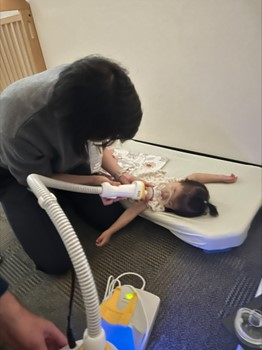Progress Report
As of April 21, 2025
546
Patients Enrolled
As of July 30, 2025
126004
Number of Samples Collected
What are we working on now?
Using oscillometry to assess changes in in lung function dynamics in infants, sedated patients and in patients who receive gene therapy

TRANSPIRE Publications
High Prevalence of Abnormal Baseline Lung Function in Pediatric and Young Adult Hematopoietic Stem Cell Transplant Recipients: A Report from the TRANSPIRE Study
What did we learn?
Lung problems are a serious concern for children and young adults undergoing stem cell transplants, but we still have a lot to learn about how preexisting lung issues affect their recovery.
In this study, doctors from eight medical centers followed 444 patients (all age 24 or younger) who received a stem cell transplant. Before the transplant, each patient’s lung health was carefully evaluated using breathing tests, chest scans, medical history, and expert review.
The results showed that half of the patients already had some lung issues before transplant. These included breathing problems seen on tests, low ability to exchange oxygen, and abnormalities found on imaging. Unfortunately, these problems tended to persist for years after transplant, and overall survival was lower in patients who had abnormal lung function to begin with.
This study highlights the importance of checking lung health before transplant. Identifying patients at higher risk may help doctors take steps earlier to protect lung function and improve long-term outcomes.
Citation: Koo J, Cooper R, Edwards SL, Lane A, Loveless SK, Strecker L, Lake KE, Myers KC, Towe C, Patti J, Walkup LL, Wikenheiser-Brokamp KA, MacMillan ML, Lacher P, Griffin T, Tekman M, Cisneros GS, Wu K, Zinter MS, Urrego FA, Baker KS, Abts MF, Ballard S, Freedman JL, Caraballo A, Young LR, Josephson MB, Allen JL, Camburn DM, Doherty EE, Azamian MS, Arredondo M, Silva-Carmona M, Lehmann LE, Wong W, Gaffin JM, McAlpine W, Li M, Goldfarb SB, Woods JC, Davies SM. High Prevalence of Abnormal Baseline Lung Function in Pediatric and Young Adult Hematopoietic Stem Cell Transplant Recipients: A Report from the TRANSPIRE Study. Pediatr Blood Cancer. 2025 Jul 21;:e31916. doi: 10.1002/pbc.31916. [Epub ahead of print] PubMed PMID: 40692216.
Community respiratory viruses are generally well-tolerated in hematopoietic stem cell transplant recipients: a brief report from the TRANSPIRE study
What did we learn?
Children and young adults who receive stem cell transplants are vulnerable to infections, but little is known about how they handle common respiratory viruses after transplant. This study followed 146 pediatric transplant patients to understand how these infections affect recovery. Over half of the patients tested positive for a respiratory virus, with rhinovirus—the virus that causes the common cold—being the most common. Most infections occurred within the first 100 days after transplant. While respiratory viruses were frequent, serious complications were rare. Only a small number of patients needed intensive care, and just one child developed severe illness from a typical seasonal virus. More serious outcomes were linked to viruses like CMV and adenovirus, which can reactivate in immunocompromised patients. Overall, the study offers reassurance that most children tolerate seasonal respiratory viruses well after transplant, and highlights the importance of balancing careful monitoring with avoiding unnecessary treatments or hospitalizations.
Citation: Haney M, Ashraf A, Lake KE, Strecker L, Myers KC, Towe C, Walkup L, Woods J, Edwards SL, Cooper R, Lehmann LE, Cisneros GS, Freedman JL, Baker KS, Doherty E, MacMillan ML, Goldfarb SB, Davies SM, Koo J, Groups T. Community respiratory viruses are generally well-tolerated in hematopoietic stem cell transplant recipients: a brief report from the TRANSPIRE study. Haematologica. 2025 Feb 27;. doi: 10.3324/haematol.2024.287107. [Epub ahead of print] PubMed PMID: 40013392.